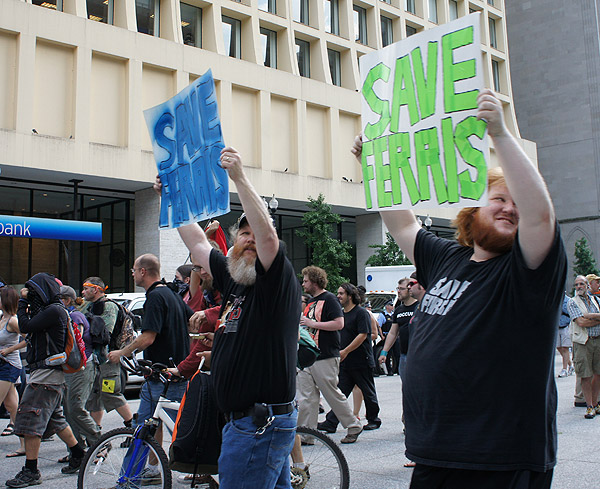
I've seen and heard it asked, and had it asked often by friends this week: Why are they protesting? What are their demands? Are they actually protesting NATO? From what I've heard, seen, and read, here's my summary of why there are so many protesters in the streets in Chicago, in descending order of direct relationship to the NATO summit.
1. The War in Afghanistan. If you're the sort of practical person who thinks, "I want to protest something, but I also want to maximize the public-policy impact of my protest by focusing on a specific issue that is close to a political tipping point," this is the best option. After 11 years of war, public opinion in the U.S. and Europe has turned against ongoing involvement. French president Francois Hollande was elected, in part, on a promise to pull French troops out of the country. There's substantial support in the fractious U.S. House to accelerate America's withdrawal. One of the key points of the summit—probably the most important one—is keeping all the NATO countries together on the timetable set in Lisbon, and even publicly there's been squishy talk by the secretary general about how it's still within the plan that France could participate in a different way.
2. NATO. It's gotten shoehorned into the planned G8 and existing Occupy agendas a bit ("the military arm of the one percent"), but there are more specific beefs. First, the U.S. provides 70 percent of the troops in Afghanistan, and 75 percent of NATO funding, leading to accusations that it's just another form of U.S. foreign aid and de facto U.S. unilateralism. Another substantial aspect of the NATO summit is getting countries to ante up for NATO dough. Anders Fogh Rasmussen said yesterday that it's not a "pledging meeting," but part of the point is getting from here to specific pledges. There's also the matter of setting another level of bureacracy between voters and military actions.
3. Austerity. Rasmussen is seeking $4.1 billion euros a year to support Afghan security forces; I've read that the consensus is the U.S. is eventually expected to pick up half of that. Meanwhile, many of the NATO countries are suffering from the effects of the global economic downturn and looking to cut back on military spending. So there's international pressure on countries to keep up defense spending; in some cases, such as Mitt Romney's Trib editorial pounding Obama, there's domestic pressure; and some protesters are providing a counterweight in support of expanding the domestic social safety net at the expense of defense budgets.
4. Wall Street. See #3. Planning for this weekend's protests began well before the G8 conference was moved from here to Camp David, and why let a good agenda go to waste? (Since the G8 is at Camp David, the protests of that are in not-exactly-nearby Frederick, Maryland, so protesting in a big city where the media is already amped up for NATO protests isn't exactly insensible.)
Another issue is the relationship between the private sector and security in developing countries. Today in an address to the Young Atlanticist summit today, retired general Jim Jones, now at the Brent Scowcroft Center on international security (more on that in a bit, I hope), discussed his belief that the "21st century needs more public-private coordination… the combination of the public and private sectors can lead to a safer world." If Eisenhower warned against the military-industrial complex, finance—both Wall Street and European banks—is at least an annex in its role in providing capital.
5. Lots and lots of other things. War; capitalism; 9-11 conspiracies; the Citizens United decision (one of my favorite signs as "JUST GOOGLE 501(C)4"), of greater and lesser specificity and seriousness.
6. Just fooling around. See photo above.



